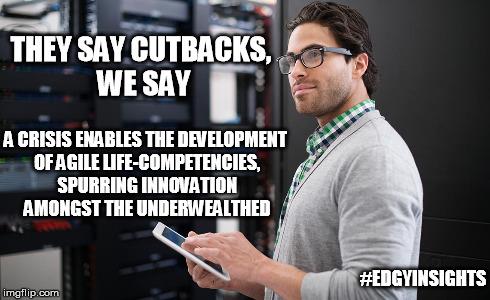
This is the basic premise of laissez-faire capitalism - that social safety nets encumber people, hold them back from developing the toughness, the hustle, the skills they need to become economically competitive. When everyone is competing for jobs, contracts, resources and whatnot, what you get is the best of the best. Period.
It's the social equivalent to natural selection - the weak or maladapted die off, leaving only successful specimens behind. Except, of course, laissez-faire doesn't take that last into consideration. For some reason, the most ardent capitalists don't talk about that part much.
Their thinking (or their spin) is exactly what "edgy insights" says - those who are suffering a critical lack of work, food, security and basic infrastructure are blessed, really, with the opportunity to be innovative, to create new solutions and will be compelled to sell hard to make some coin and change their lot in life.
That's how it works, right? Those with resources - massive corporations, VC, the collective consumer - don't have to design or innovate anything. They do not sow. They don't have to collaborate with or empower or even inform, unless compiled to by great marketing and pitches, to do anything other than decide where to put their dollars.
The haves only dole out jobs, or contracts, or funds to those who convince them to. The have-nots have to fight, hustle and best competition to get access to resources. Same for firms - you can buy the innovative ones, which is so much cheaper than innovating yourself.
It's an easy frame without any messy complications.
Except that isn't how natural selection works; innovation isn't consciously developed and marketed, it happens organically and biologically. If anything, the more resource-hungry a group is (whether it's political parties or private companies) the more combative they become.
How do you get to the top of the resource ladder in any laissez-faire system, be it a tribe of gorillas or a political organization? Not through innovation, but by taking out the guy above you.
Here's what history teaches us - a reduction in service and resource access doesn't result in innovation, it results in violence. It's the shrinking waterhole scenario.
Some other things to consider:
If you're "ethnic" you have to struggle even harder to get ahead. That's before you get into postal code stigma, racial carding, etc.
Successful people constantly promote the concept of the quick win, the low-hanging fruit/ Get something fast, demonstrate success, then get the next one, and the next one.
If something or someone doesn't look to offer a short-term Return on Investment (ROI), you don't bother with it. Which is why the have-nots must provide massive value-add from the get-go if they want some of the resources held by the haves.
Or, you could create a quick-win scam that not only has a greater chance of ROI with less creative investment, but also makes you feel like someone's beneath you on the social ladder. Or you could steal, smuggle, join a gang. These are all quick-wins and often not that dissimilar from what the successful people do.
Is there much difference between a political fundraising campaign using scare tactics or empty promises in exchange for money vs. the guy promising to fix your heating ducts for a surprising low cost?
The other option, of course, is to loose everything, become homeless and sleep on the street.
In both scenarios, the weak don't die off - they move onto the streets creating crime risks, spreading illness, etc. In every place in the world I've been to where laissez-faire is truly practised, the wealthy live behind gated walls topped by iron spikes or crushed glass. Heavily armed guards must be present wherever money is exchanged in quantity. Street scams, pick-pocketing and muggings are common.
That's before you get into organized crime.
Places like Columbia have gotten out of their holes by increasing, not decreasing capacity for society's most marginalized. So of course the champions of laissez-faire want to do the opposite, because they make their own reality, doncha know.
So by all means, people cutting resource access to those below them while maintaining or increasing their own, do your thing. Grab for your low-hanging fruit and buy into your own messaging.
Just don't dare tell us no one ever warned you about the consequences.
After all, there's no room in this world for whiners.

No comments:
Post a Comment